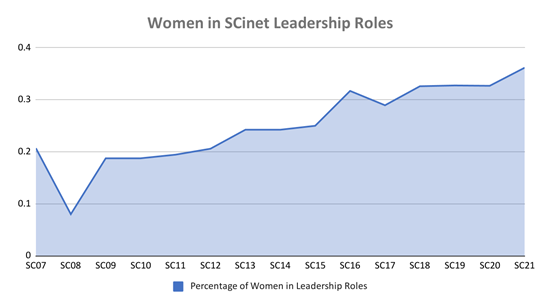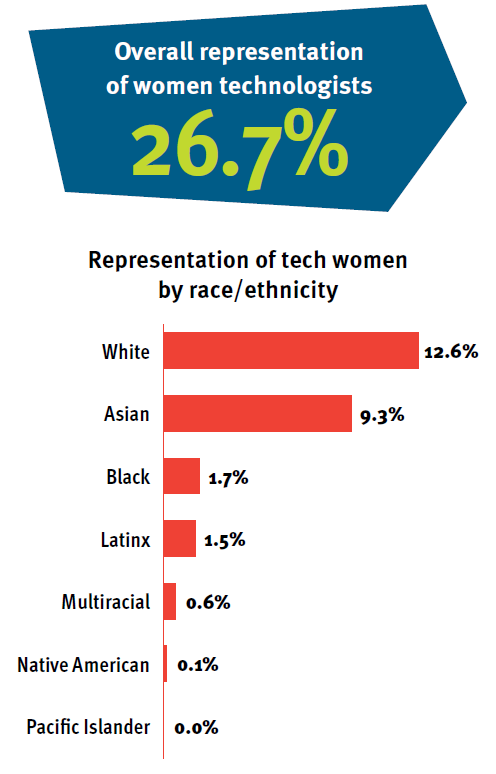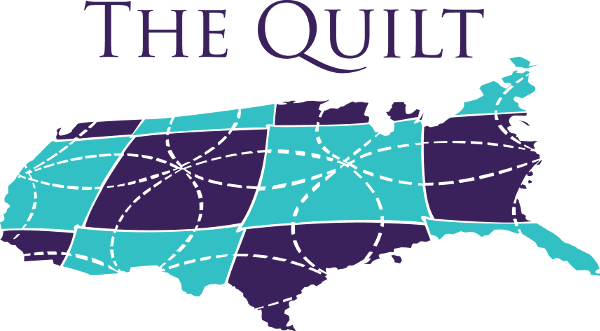“I feel lucky to have participated in this complex and interesting group project. The fellow engineers I met will hopefully become lifelong colleagues.” – Mary Bull
During the week of November 14th, 2021, six women participated in the Women in IT Networking at SC (WINS) program at SC21, the International Conference for High Performance Computing (HPC), Networking, Storage and Analysis, which took place in St. Louis, Missouri.
Each year, a volunteer workforce designs and creates SCinet, the fastest and most powerful volunteer-built network in the world, to support the SC Conference. Since SC91, SCinet has provided SC attendees and the HPC community with the innovative network platform necessary to connect, transport, and display HPC research at SC from around the world. In addition to high-performance demos, SCinet supports wired and wireless connections for attendees to maintain connectivity to the rest of the world. SCinet takes a year to plan, a month to build, a week to operate, and a day to tear down.
The volunteers building the SCinet infrastructure come from academia, government, and industry. As such, SCinet provides an ideal “apprenticeship” opportunity for engineers and technologists looking for direct access to the most cutting-edge network hardware and software, while working side-by-side with the world’s leading network and software engineers and top network technology vendors. The WINS program seeks qualified female U.S. candidates in their early to mid-career to join the SCinet volunteer workforce.
WINS was developed in 2015 to help address the gender gap that exists in information technology, particularly in the fields of network engineering and HPC. The program seeks women of all ages, races, backgrounds, IT-related professions, and geographic areas.
“In the technology industry specifically, women faced challenges in what was ultimately deemed a ‘she-cession.’ The total representation of technical women decreased by 2.1 percentage points from 2020 to 2021. The representation of technical women decreased at all levels except intern.” – TCI Insights Report.
Data continues to show there are significant ongoing discrepancies in the number of women — particularly underrepresented minorities — in IT fields, and COVID appears to have exacerbated this trend.

This year, WINS management focused on outreach to underrepresented and underserved groups and organizations. In order to further broaden the diversity within the WINS program itself, preference this year was given to applicants who are historically underrepresented in the Information Technology field, including Black or African American, American Indian or Alaska Native, and Hispanic or Latinx. To date, nine percent of the WINS applicants and fifteen percent of the finalists work at Minority Serving Institutions.
For SC21, the WINS team and participants faced unusual challenges with the uncertainties of COVID. WINS management worked with the SCinet team to monitor the meeting status, implement safety measures, and commit to covering unexpected costs. WINS participants were offered the option to defer if they had travel restrictions. Three participants did choose to defer.
In 2021, nineteen women applied, with five selected, the most diverse WINS cohort to date. The following women participated in SC21:
- Mary Bull, College of William & Mary, SCinet Wireless Team
- Melinda DeHerrera, Los Alamos National Laboratory (LANL), SCinet Fiber Team
- Jennifer Kim, Montgomery County Community College, SCinet Edge Team
- Deshon Miguel, Tohono O’odham Community College, SCinet WAN Team
- Stacie Nixon, North Carolina Central University, SCinet Wireless Team
- Shashwitha Puttaswamy, The George Washington University, SCinet Routing Team
Those who deferred to SC22 include:
- Kristen Beneduce, Sandia National Laboratories, SCinet Network Security Team
- Karen Lopez, National Renewable Energy Lab (NREL), SCinet DevOps Team
- Kimberly Schjang, University of Nevada – Las Vegas, SCinet Edge Team
“SC21 was an amazing experience. I learned so many skill sets, in and out of my realm, which I was able to apply to my current job. I would definitely love to do it all over again, ask more questions, and gain more insight into the whole process. I had a great time!” – Melinda DeHerrera
Over the past year, due to the restrictions on in-person gatherings, WINS implemented monthly WINS alumni virtual meetings, encouraging interaction between WINS participants to discuss general topics of interest, including the impacts of COVID on them and women in general. These meetings proved to be effective, well-attended, and successful.
“SC is a unique event built on teamwork and miles of networking that has to be experienced to be understood. I am grateful to have been part of SCinet for SC21, which proved to be a challenging yet uplifting opportunity rooted in support and professional growth.” – Jennifer Kim
Since 2007, when only 15 of the 105 volunteers (14%) were women, the number of women participants has grown. In 2021, 35 of the 123 volunteers (29%) were women. Nineteen of those women were either previous or current participants in the WINS program. Nine of the SCinet team leads in SC21 were previous WINS participants.
Members of the SC21 WINS coordinating team include PI Marla Meehl, Belinda Green, Susan Guastella, and Carlos Rojas Torres (SCinet Inclusivity Liaison), of UCAR; co-PI Wendy Huntoon of Keystone Initiative for Network Based Education and Research (KINBER); Jason Zurawski, Lauren Rotman, and Kate Robinson of ESnet; and Kimball Sekaquaptewa with Santa Fe Indian School (SCinet Co-Chairs of WINS).
WINS is a joint effort between the University Corporation for Atmospheric Research (UCAR), the Department of Energy’s Energy Sciences Network (ESnet), and the Keystone Initiative for Network Based Education and Research (KINBER). The multi-year program is funded primarily by grants from the National Science Foundation (NSF), direct funding from ESnet with support from the Department of Energy, and donations to the program. Due to COVID travel restrictions, ESnet did not provide programmatic support for SC21.

